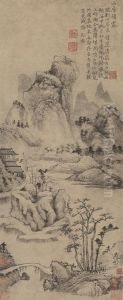Lu Guang Paintings
Lu Guang is a Chinese photojournalist known for his hard-hitting visual documentation of environmental and social issues in China. Born in 1961 in Zhejiang province, Lu developed an interest in photography while working in a silk factory as a teenager. His passion for capturing images led him to pursue further education in photography, and he eventually graduated from the Fine Arts Academy of Tsinghua University (formerly known as the Academy of Arts & Design of Tsinghua University) in Beijing.
Lu's work is characterized by its focus on the under-reported and often harsh realities of life in various parts of China. He gained international recognition through his powerful series of photographs that reveal the impacts of pollution in China, the spread of HIV/AIDS among Henan province villagers through unsafe blood selling practices, and the 'Aids Village' in Henan, among others. His work not only captures the human suffering and environmental degradation but also sheds light on the stories of individuals who are frequently neglected by mainstream media.
His photography has received numerous awards, including the World Press Photo award, the W. Eugene Smith Grant in Humanistic Photography, and the Henri Nannen Prize in Photojournalism, among others. Despite his accolades, Lu Guang's work has not been without controversy, particularly within China, where sensitive topics such as pollution and social issues are often censored by the government. This has made Lu a significant figure in the realm of documentary photography and journalism due to his courage and determination to bring these subjects to light.
Lu Guang's commitment to revealing the truth has come at a personal cost. In November 2018, it was reported that Lu had been taken away by state security agents while visiting Xinjiang, a region in China known for its heavy surveillance and repression of the Uighur minority. News of his disappearance raised international concern among human rights and press freedom groups. After some time, it was confirmed that he was indeed detained by Chinese authorities, although the reason for his detention was not made clear. His current situation is a matter of ongoing concern for advocates of free expression and journalistic freedom.
Despite the challenges he has faced, Lu Guang's work remains an important and influential part of the global conversation on environmental and social issues. His photography serves as a poignant reminder of the power of visual storytelling in advocating for change and bringing to light the stories of those who might otherwise remain unseen.
